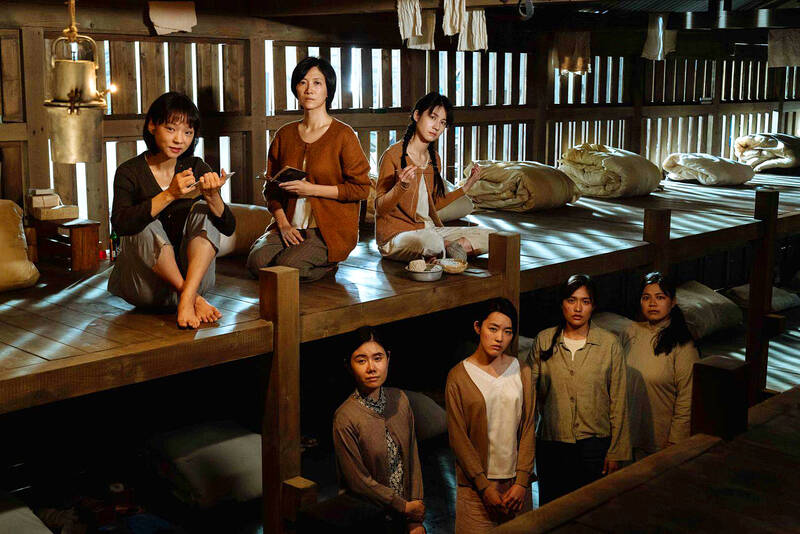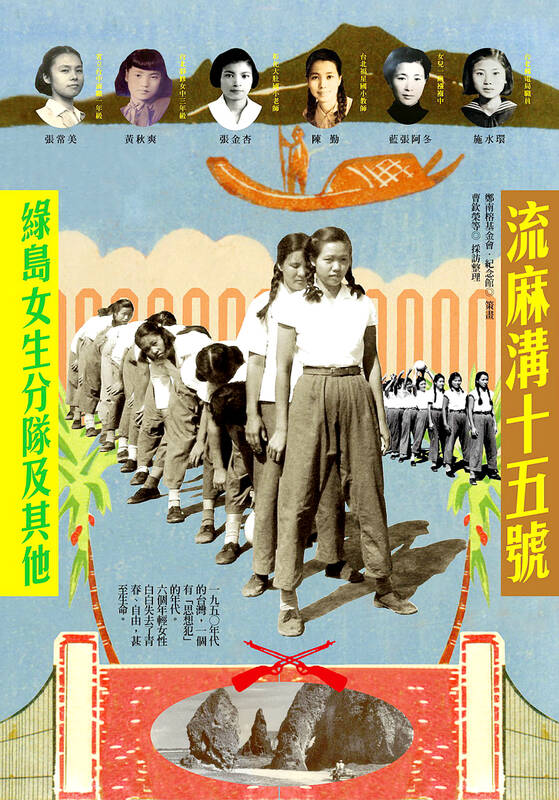Oct 31 to Nov 6
Chang Chang-mei (張常美) was just 19 years old when she was suddenly summoned out of class, led into a jeep and thrown in a small cell. “Isn’t this where they put bad people?” she thought.
Later that day, the guards dragged in two of her male classmates. Chang wept until the sun came up, but this ordeal on April 10, 1950, was just the beginning of the nightmare.

Photo: File photo
Months later, Chang found out that she was arrested because the leader of her school’s student government, of which she was an officer, was accused of being a communist. Chinese Nationalist Party (KMT) agents made the terrified Chang sign a confession under a blinding light in a room filled with torture devices, and was sentenced to 12 years for joining a seditious organization — a common charge during White Terror.
“I was just a 14, 15-year-old girl when I joined the student government,” she recalls in the 2012 book, Liumagou No. 15 (流麻溝十五號). “I didn’t join the [KMT], nor did I join the communist party. I just wanted to get an education, I didn’t care about those things.”
Chang spent time in several facilities before landing on Green Island in 1953. She was referred to as No. 72, one of roughly 100 women who made up the often-forgotten female division of political prisoners on the island. Their ordeal of forced labor, torture and “re-education” is featured in the new film Untold Herstory (流麻溝十五號), which hit the theaters on Friday.

Photo courtesy of Activator Marketing Co
The fictional plot is based on the book, which details the experiences of six female political prisoners, four of whom spent time on Green Island. The book’s final character, Shih Shui-huan (施水寰), was the only one who did not make it out alive; her tragic story and execution was featured in the June 18, 2021 edition of “Taiwan in Time.”
LIFE ON THE ISLAND
Chang had already seen and experienced much suffering and hardship by the time she arrived on Green Island. Her cell in the first facility was next to the interrogation rooms, and she could clearly hear men being beaten and tortured all night.

Photo courtesy of GJTaiwan
She was later held in cramped, unsanitary conditions with other women and children, and recalls inmates giving birth in the cells. Executions took place during the wee hours, and the women would shudder whenever footsteps approached their cell, wondering if they would be the next to go. One of the most harrowing memories was watching crying children cling on to their mothers who were being dragged off to the firing squad.
On Green Island, the prisoners were mostly confined to the fenced living areas, and only let out to attend classes, do laundry and carry water. Some women, mostly from China (“mainlanders”), joined a theater troupe that put on anti-communist performances. They rehearsed in a cave by the shore.
The male prisoners grew vegetables and cooked — Chang recalls that it was the best food she had during her 12 years of imprisonment. Those who broke the rules were often confined to a solitary bunker, where they stayed for months at a time living in their excrement. Many went mad.

Photo courtesy of Wikimedia Commons
RE-REBELLION CASE
Chang didn’t spend much time in Green Island. She was sent to Taipei at the end of 1953 to stand another trial due to suspected involvement in the infamous “re-rebellion” case (再叛亂案) in the camp, which features heavily in the movie’s plot. She recalls that her arrest was due to letters sent to her by former classmate and fellow prisoner Hsu Hsueh-chin (許學進), who encouraged her to join the passive resistance against the prison’s draconian rules.
The prisoners were particularly adverse to the “One Person, One Heart, Save the Country with Good Conscience Movement” (一人一心良心救國運動), which involved tattooing anti-communist slogans on their bodies.
Chang was terrified and immediately destroyed the first letter, but the second was intercepted by prison authorities. She insisted that the first note was a love letter, which she ignored because she was not in the mood for romance in jail, and that she had no idea what the second one was about.
The prisoners didn’t talk much with each other, Chang recalls, as snitching was common. Hsu was caught because a close friend of his reported his behavior to the guards.
Chang was sure she was going to die.
“I got 12 years without any evidence, what are they going to do now that there is evidence?” she wondered.
Fortunately, she was acquitted. Fourteen people, including Hsu, were executed for this incident, their death warrants personally signed by KMT leader Chiang Kai-shek (蔣介石).
The lone woman executed in this ordeal was Fu Ju-chih (傅如芝), with whom Chang spent time on Green Island. According to Chang, she was nabbed for failing to copy down the parts of her “political education” textbooks that criticized communism. But what really got her killed were the letters she exchanged with the incident’s main suspect, Chen Hua (陳華), which she hid under the cap of a hot water bottle. Someone must have notified authorities because the guards knew immediately where to look when they entered the cell. Fu was just 23 years old.
Chang remained in a correctional facility until her release in 1962. A few years later, she married Ouyang Chien-hua (歐陽劍華), a fellow prisoner whom she met at her last stop, and after much initial hardships, the two were able to cobble together a decent life with four children.
Taiwan in Time, a column about Taiwan’s history that is published every Sunday, spotlights important or interesting events around the nation that either have anniversaries this week or are tied to current events.

On April 26, The Lancet published a letter from two doctors at Taichung-based China Medical University Hospital (CMUH) warning that “Taiwan’s Health Care System is on the Brink of Collapse.” The authors said that “Years of policy inaction and mismanagement of resources have led to the National Health Insurance system operating under unsustainable conditions.” The pushback was immediate. Errors in the paper were quickly identified and publicized, to discredit the authors (the hospital apologized). CNA reported that CMUH said the letter described Taiwan in 2021 as having 62 nurses per 10,000 people, when the correct number was 78 nurses per 10,000

As we live longer, our risk of cognitive impairment is increasing. How can we delay the onset of symptoms? Do we have to give up every indulgence or can small changes make a difference? We asked neurologists for tips on how to keep our brains healthy for life. TAKE CARE OF YOUR HEALTH “All of the sensible things that apply to bodily health apply to brain health,” says Suzanne O’Sullivan, a consultant in neurology at the National Hospital for Neurology and Neurosurgery in London, and the author of The Age of Diagnosis. “When you’re 20, you can get away with absolute

May 5 to May 11 What started out as friction between Taiwanese students at Taichung First High School and a Japanese head cook escalated dramatically over the first two weeks of May 1927. It began on April 30 when the cook’s wife knew that lotus starch used in that night’s dinner had rat feces in it, but failed to inform staff until the meal was already prepared. The students believed that her silence was intentional, and filed a complaint. The school’s Japanese administrators sided with the cook’s family, dismissing the students as troublemakers and clamping down on their freedoms — with

As Donald Trump’s executive order in March led to the shuttering of Voice of America (VOA) — the global broadcaster whose roots date back to the fight against Nazi propaganda — he quickly attracted support from figures not used to aligning themselves with any US administration. Trump had ordered the US Agency for Global Media, the federal agency that funds VOA and other groups promoting independent journalism overseas, to be “eliminated to the maximum extent consistent with applicable law.” The decision suddenly halted programming in 49 languages to more than 425 million people. In Moscow, Margarita Simonyan, the hardline editor-in-chief of the